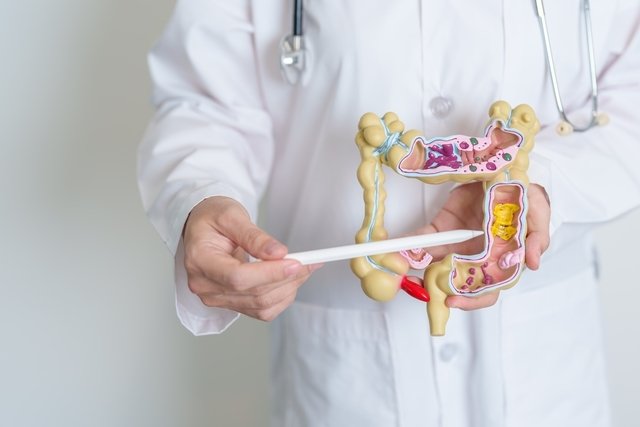The main symptoms of colitis are colicky abdominal pain, watery diarrhea, blood and/or mucus in the stool, fever above 37.2ºC and a sudden urge to have a bowel movement, and others may also appear depending on the cause.
Inflammation of the colon is known as colitis and can be caused by diseases such as gastroenteritis, ulcerative colitis or allergies, low blood flow to the colon, medications such as some antibiotics and antihypertensives or radiotherapy, for example.
Read too: Colitis: what it is, symptoms, causes, types and treatment
If colitis is suspected, it is recommended to consult a gastroenterologist or general practitioner to confirm the diagnosis and initiate the most appropriate treatment, which must be specific to its cause and can help control symptoms.

Main symptoms
The main symptoms of colitis are:
1. Abdominal pain
The pain in the abdomen caused by colitis can be noticed as cramping that sometimes goes away after the person has a bowel movement. This pain tends to vary in intensity and location according to the severity of the inflammation and the region of the colon affected, and may also be recurrent in some cases.
What to do: Sometimes, abdominal pain can be relieved by consuming easily digestible foods and avoiding those that may be associated with episodes of colitis.
However, it is important to consult a gastroenterologist or general practitioner and undergo specific treatment for the cause of colitis, which may involve the use of medications such as antibiotics or corticosteroids, for example, to alleviate symptoms.
Don’t ignore your symptoms!
Diarrhea is one of the main symptoms of colitis, which can cause the stool to become watery and lead the person to have bowel movements up to 6 times or more per day. It can also cause dehydration, especially when it is not possible to replace fluid loss.
What to do: In case of diarrhea, it is recommended to maintain good hydration and drink fluids, especially oral rehydration serum, after bowel movements to avoid dehydration.
Read too: How to stop diarrhea faster: 8 effective tips
However, especially if other symptoms appear or the diarrhea is not improving, it is recommended to consult a gastroenterologist so that the cause can be identified and the most appropriate treatment can be started.
3. Blood and/or mucus in the stool
The presence of blood and/or mucus in the stool is also common in the case of colitis, especially when caused by bacteria or inflammatory bowel diseases, such as ulcerative colitis or Crohn’s disease.
Blood and mucus usually appear mixed in stool. However, in some cases the person may also eliminate live blood or experience more intense bleeding when evacuating, for example.
What to do: The blood and/or mucus in the stool tends to disappear as the colitis treatment is carried out in accordance with the doctor’s instructions, and it is recommended to consult a gastroenterologist or general practitioner as soon as possible.
The doctor may recommend medication adjustments or the use of specific anti-inflammatories and antibiotics, for example, depending on the cause of the colitis. However, in case of heavy bleeding, it is recommended to go to an emergency room for an evaluation.
4. Fever
Colitis can also cause fever above 37.2ºC, especially when associated with infections and inflammatory bowel diseases. Furthermore, depending on its cause, fever is not always associated with other symptoms.
What to do: It is recommended to consult a gastroenterologist or general practitioner so that the cause of the colitis can be identified and the most appropriate treatment can be initiated. The doctor may also prescribe antipyretic medications to relieve the fever caused by colitis. Check out the main remedies recommended to reduce fever.
5. Urge to evacuate
Due to inflammation of the colon, it is common for people with colitis to feel the urge to have a bowel movement, which can be sudden and is not always associated with the elimination of feces, known as tenesmus.
Read too: Tenesmus: what it is, symptoms, causes and treatment
Furthermore, the urge to have a bowel movement can occur even during sleep, causing the person to wake up and get out of bed to run to the bathroom.
What to do: Preferring easily digestible foods can help alleviate the sudden urge to have a bowel movement. However, the ideal is to consult a gastroenterologist or general practitioner for specific colitis treatment, which can control colon inflammation and alleviate symptoms.
Online symptom test
Some types of colitis, such as ulcerative colitis, are considered inflammatory bowel diseases. To find out your chances of having inflammatory bowel disease, please select the symptoms you present:
This test is only a guidance tool, and therefore, is not intended to provide a diagnosis, nor replace a consultation with a gastroenterologist.
Bibliography
- STATPEARLS. Pseudomembranous Colitis. 2023. . Accessed on March 11, 2024
- BETTERHEALTH. Crohn’s disease and ulcerative colitis. Disponível em: <https://www.betterhealth.vic.gov.au/health/conditionsandtreatments/crohns-disease-and-ulcerative-colitis>. Acesso em 11 mar 2024
- MACAIGNE, Gilles. Eosinophilic colitis in adults. Clinics and Research in Hepatology and Gastroenterology. Vol.44, n.5. 630-637, 2020
- CLEVELAND CLINIC. Colitis. Available at: <https://my.clevelandclinic.org/health/diseases/23384-colitis>. Accessed on March 11, 2024
- JESSURUN, Jose. The Differential Diagnosis of Acute Colitis: Clues to a Specific Diagnosis. Surg Pathol Clin. Vol.10, n.4. 863-885, 2017
- STATPEARLS. Bacterial Gastroenteritis. 2023. Available at: <https://www.ncbi.nlm.nih.gov/books/NBK513295/>. Accessed on March 11, 2024
- STATPEARLS. Colitis. 2023. Available at: <https://www.ncbi.nlm.nih.gov/books/NBK541037/>. Accessed on March 11, 2024

Sign up for our newsletter and stay up to date with exclusive news
that can transform your routine!
Warning: Undefined array key "title" in /home/storelat/public_html/wp-content/plugins/link-whisper-premium/templates/frontend/related-posts.php on line 12
Warning: Undefined array key "title_tag" in /home/storelat/public_html/wp-content/plugins/link-whisper-premium/templates/frontend/related-posts.php on line 13



